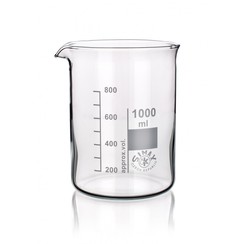You have no items in your shopping cart
Beakers
A beaker is a simple glass device for various purposes in (mostly scientific) laboratories. It is understood as a cylindrical cup with a flared rim on the top and usually a spout. A coarse volume scale is usually printed on the side.
Together with the test tube and the conical flask, the beaker is one of the most commonly used glass vessels in the laboratory.
The beaker is used for a variety of tasks requiring a simple glass vessel, such as collecting or mixing liquids or preparing simple solutions. It is cheap, easy to fill thanks to the large opening and allows you to stir the contents with a glass rod, for example. The transparent borosilicate glass most commonly used as a material is resistant to heat and most chemicals, so beakers made from them are also suitable as simple reaction vessels and for heating. Polypropylene cups are not heat resistant and also less resistant to chemicals.
In the case of a conventional beaker ("wide / wide shape"), the height to diameter ratio is usually about 1.4. This regular version with a spout is sometimes referred to as "Griffin shape" (especially in the English-speaking world). In "tall shape" beakers, the height usually corresponds to about twice the diameter. This shape is also called the "Berzelius cup".
A beaker differs from a flask in that it has a straight side wall. The exception is the slightly conical Philips cup.
You can buy these beakers at Laboratory discounter with a fast delivery for a friendly price.

